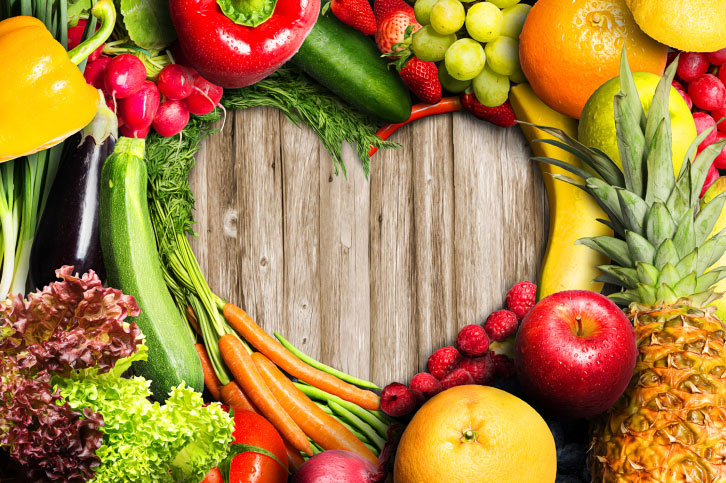Eat a variety of fruit and vegetables to keep your body healthy. Fish and whole grains are also great choices. Avoid fast food and soda. Eat plenty of fruits and vegetables every day. And don’t forget to eat plenty of protein foods like fish, poultry, and nuts and seeds. Eat more fruits and vegetables than you think! Try these tips to make your life healthier.
Fruits and vegetables
Consuming fruit and vegetables daily can lower your risk of heart attack, stroke, cancer, and early death. Consuming just 10 portions of fruit and vegetables daily, or about 800 grams, can prevent 7.8 million premature deaths each year. The World Health Organization recommends that we eat five portions of fruit and vegetables every day, but that target has been elusive for many years. In order to increase fruit and vegetable consumption, governments around the world have launched campaigns to encourage the public to eat more of them.
The best way to add more fruit and vegetables to your diet is to incorporate a variety of them into your meals. Mixing and matching different colors and shapes of fruits and vegetables gives you a diverse mix of nutrients, and you get to taste a variety of flavors and textures. You can also prepare different kinds of fruit and vegetables as salads, soups, and stir-fries. By incorporating more fruit and vegetables into your everyday meals, you can increase the amount of nutrients you get and improve the taste of your dishes.
Fish
If you’re looking for a healthier lifestyle, eating fish might be the right option. While some people are hesitant to consume fish due to concerns about pollution and sustainability, the majority of Americans enjoy eating it a few times a week. One-third of Americans consume seafood at least once per week, and nearly half eat it only occasionally. These low consumption rates are probably influenced by various factors, including uncertainty over the quality and cost of certain fish, and fears about contaminants.
Eating fish can help you feel better, improve your skin and boost your metabolism. It can also help you sleep better, reduce your risk of inflammation, and increase your concentration. The benefits of fish eating are numerous, and the taste factor is just as important as the health benefits. So, what are you waiting for? Give fish a try today and start living a healthier life. You’ll be amazed by the benefits! Fildena is make you feel higher and also boost your immune system, long physical ability, etc.
Whole grains
Eating whole grains may add years to your life. According to a Harvard-led study, eating whole grains lowers the risk of cardiovascular disease and early death by as much as 9 percent. However, consumption of refined grains was not linked to a reduction in the risk of cancer deaths. But this doesn’t mean that eating whole grains alone is healthy – you need to eat a varied diet containing a variety of foods in order to reap the benefits of their benefits.
According to the American Heart Association, eating three servings of whole grains per day can reduce your risk of dying prematurely by as much as 20%. That is not surprising if you consider that the number of calories you burn during your day depends on your weight. But it may come as a surprise to learn that whole grains are also good for your waistline. In addition, a recent study published in the journal Circulation suggests that three servings of whole grains a day may also help you lose weight by keeping you satisfied longer.
Whole grain bread
Eating three servings of whole grains each day is a great way to keep your heart, blood pressure and other health problems at bay. A recent analysis by the Harvard School of Public Health found that eating at least three servings of whole grains daily reduced the risk of death from cardiovascular disease, cancer, and stroke. While many people avoid gluten and carbs for health reasons, this new research shows that they actually contribute to a healthier life.
To start, whole grains must contain all the parts of the kernel, including the bran, germ, and endosperm. Non-whole grains remove these parts to make them appear whiter. However, this process strips the seed of vitamins, minerals and phytochemicals, which are naturally present in plants. While non-whole grains may contain small amounts of vitamins, whole grains are bursting with essential nutrients. To make whole grain bread, simply soak the grain overnight before milling it.
Eggs
There’s no doubt that eating eggs can boost your health. They are an affordable source of protein and are packed with vitamins and minerals. Plus, they can help you feel full and energized. But they have some drawbacks too. Eggs are high in cholesterol and saturated fat, so people who suffer from heart disease should limit their intake. Those with diabetes can enjoy egg whites without guilt.
Among the benefits of eggs are that they go well with veggies. When cooking eggs, choose oils that are stable at high temperatures, so they don’t develop free radicals. Also, look for pasture-raised eggs. Organic and pasture-raised eggs are thought to be more nutritious. Likewise, avoid over-cooking them, as longer cooking can damage the nutrients in them.
One of the many nutrients that eggs contain is vitamin B12. While it’s found primarily in animal products, eggs are an excellent source of it for vegetarians. Eggs are also rich in choline, which helps nerve cells communicate with one another. They can also reduce the risk of depression and anxiety, both of which can lead to ED and ED solution is Fildena 150.
Nuts
Eating nuts is good for your health, but how much are you eating? A recent study analyzed data on 76,464 women and 42,498 men who had died over nearly 30 years. Participants were asked about their nut consumption at the beginning of the study, and then every few years afterward. Researchers also kept track of death rates, and those who ate nuts frequently were less likely to die. Regardless of whether the nuts were fried or raw, eating nuts is linked to a decreased risk of dying from heart disease, angina, and cancer.
Researchers at Harvard Medical School and Dana-Farber Cancer Institute looked at the effects of nut consumption on the risk of developing several cancers. They found that people who ate nuts frequently had lower rates of cancer and heart disease than those who ate fewer nuts. They also reported that they were less likely to be overweight or smoke. The researchers said this is the result of a combination of factors, including the amount of time the participants ate nuts.
Avocados
You should purchase avocados at their ripest stage. They should yield to gentle pressure when squeezed, or they’re too overripe. Avocados store well in the refrigerator for two to three days. If you’re not ready to eat it right away, peel off the pit and brush it with citrus juice or vinegar to prevent browning. You can also store half an avocado on a plate.
Avocados contain monounsaturated fats and antioxidants that lower the risk of macular degeneration and cataracts. These fruits are also a good source of fiber, which is important for weight loss and digestion. The average avocado contains seven grams of fiber, which is around 27% of the recommended daily value. These foods also lower “bad” cholesterol and are high in fiber. For this reason, avocados are an excellent choice for people on low-carb and vegan diets.
Avocados contain over 25 essential nutrients, including potassium, which supports a healthy blood pressure. It’s a better source of potassium than bananas, and it increases HDL cholesterol in the blood, which helps remove bad cholesterol. It is also a good addition to salads made of green leafy vegetables. Avocados are high in monounsaturated oleic acid, which reverses insulin resistance and stabilizes blood sugar levels.
Olive oil
According to a new study, olive oil consumption may signal a healthier lifestyle. In a study of nearly 90,000 Americans, researchers found that a higher olive oil consumption was associated with lower cardiovascular disease and cancer mortality and a lower risk of respiratory disease. The researchers looked at data from two studies: the Nurses’ Health Study and the Health Professionals Follow-Up Study. The people in both studies were heart disease-free in 1990. The researchers asked people about their diet and lifestyle to determine how much olive oil they consumed.
Researchers found that olive oil is loaded with antioxidants, including vitamin E, a fat-soluble antioxidant that protects cell membranes from free radicals. In addition, olive oil contains monounsaturated fats that support healthy cholesterol levels and inflammatory responses. The study also found that olive oil may be effective in reducing inflammation in the brain, which is a risk factor in neurological disorders such as depression. In addition, the oil may help with balancing hormone levels and minimizing cortisol. Using olive oil in cooking is a great way to get your daily dose of healthy fats.




